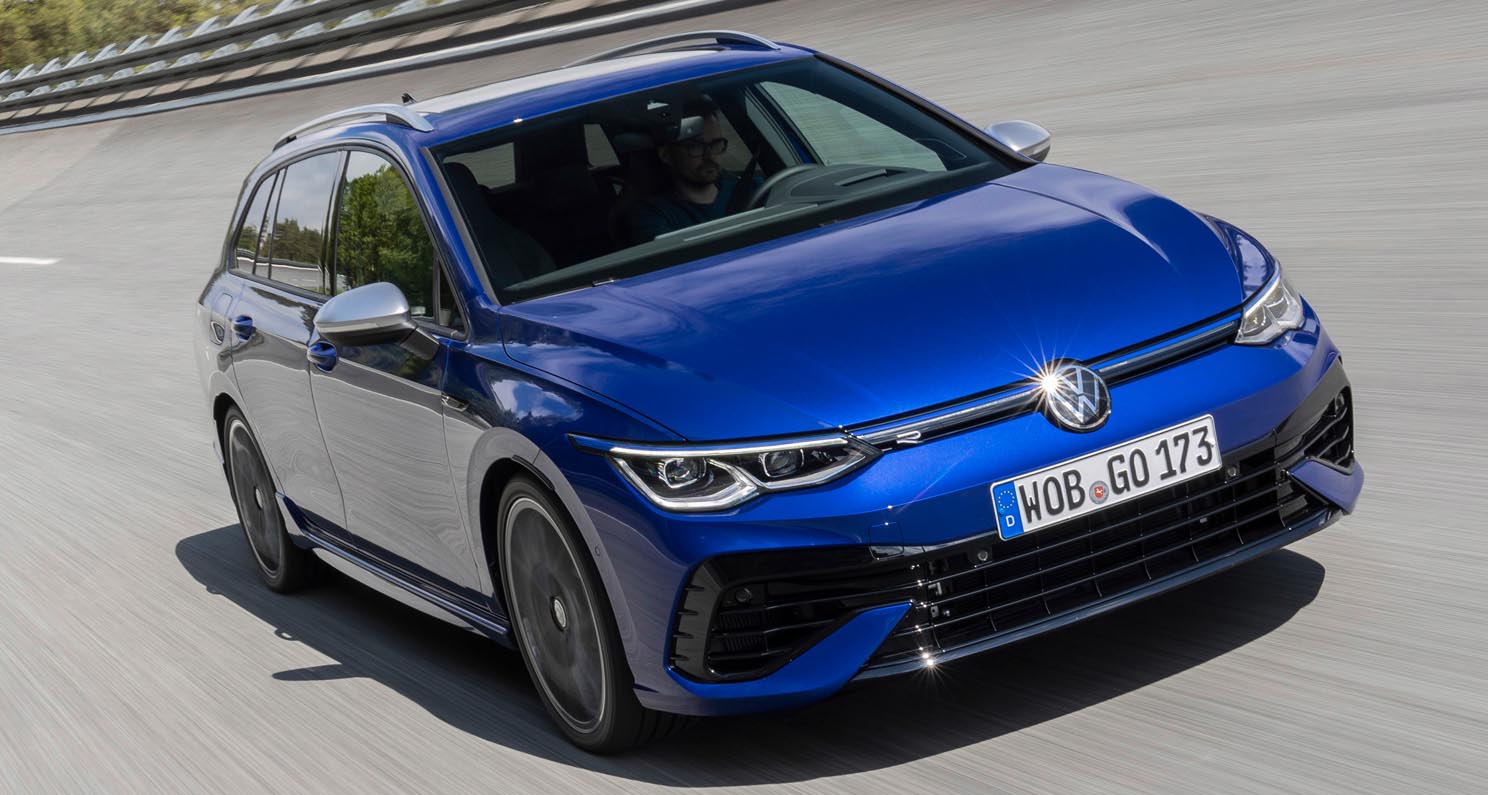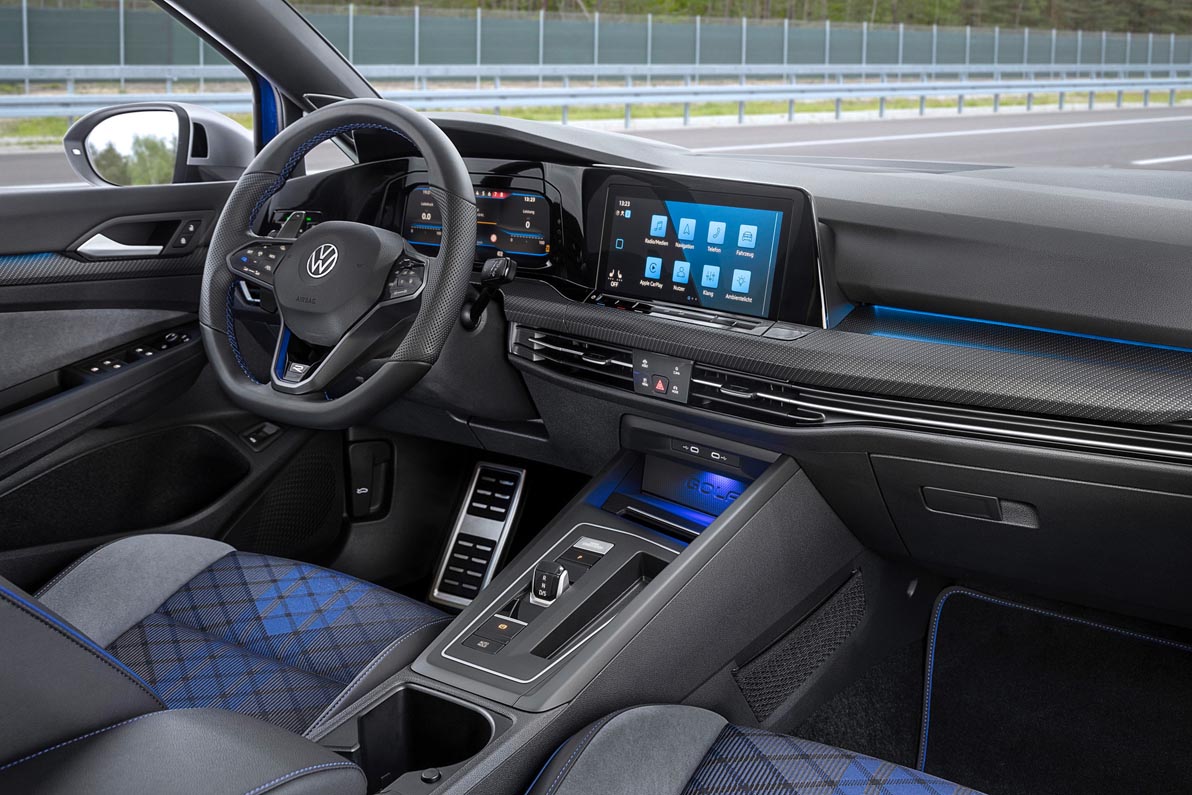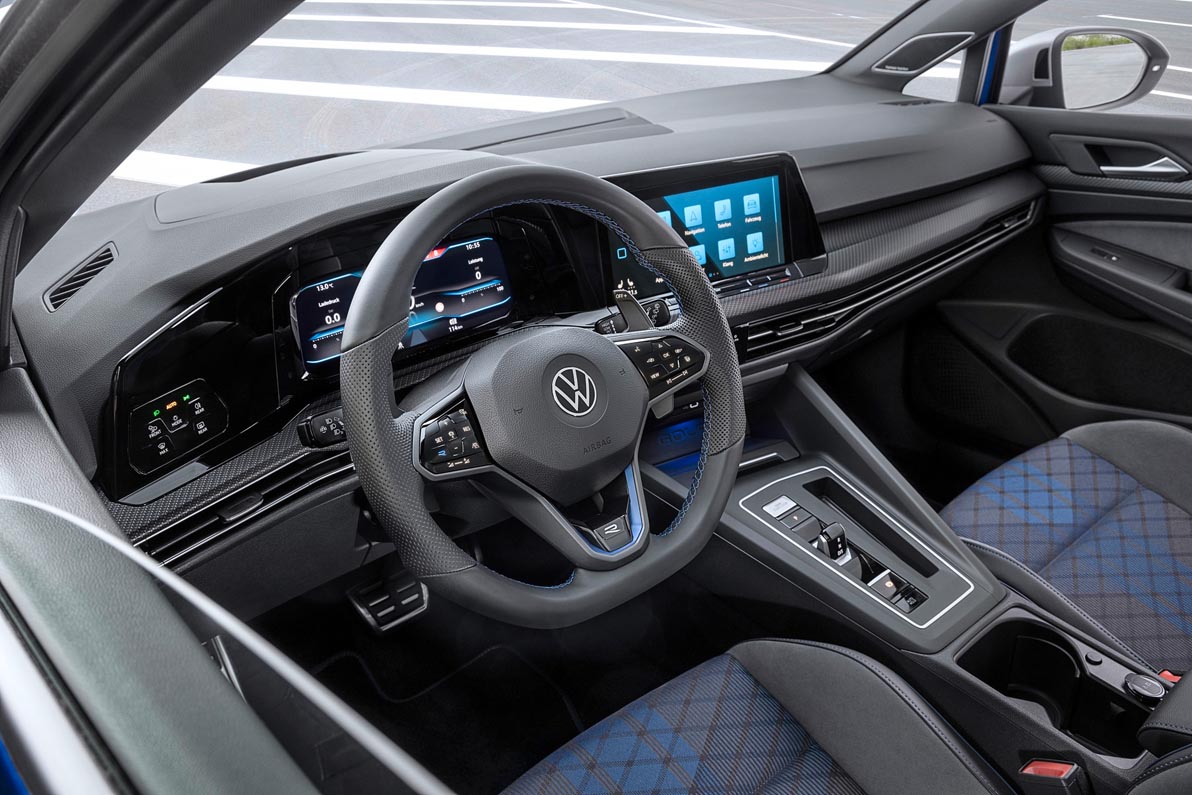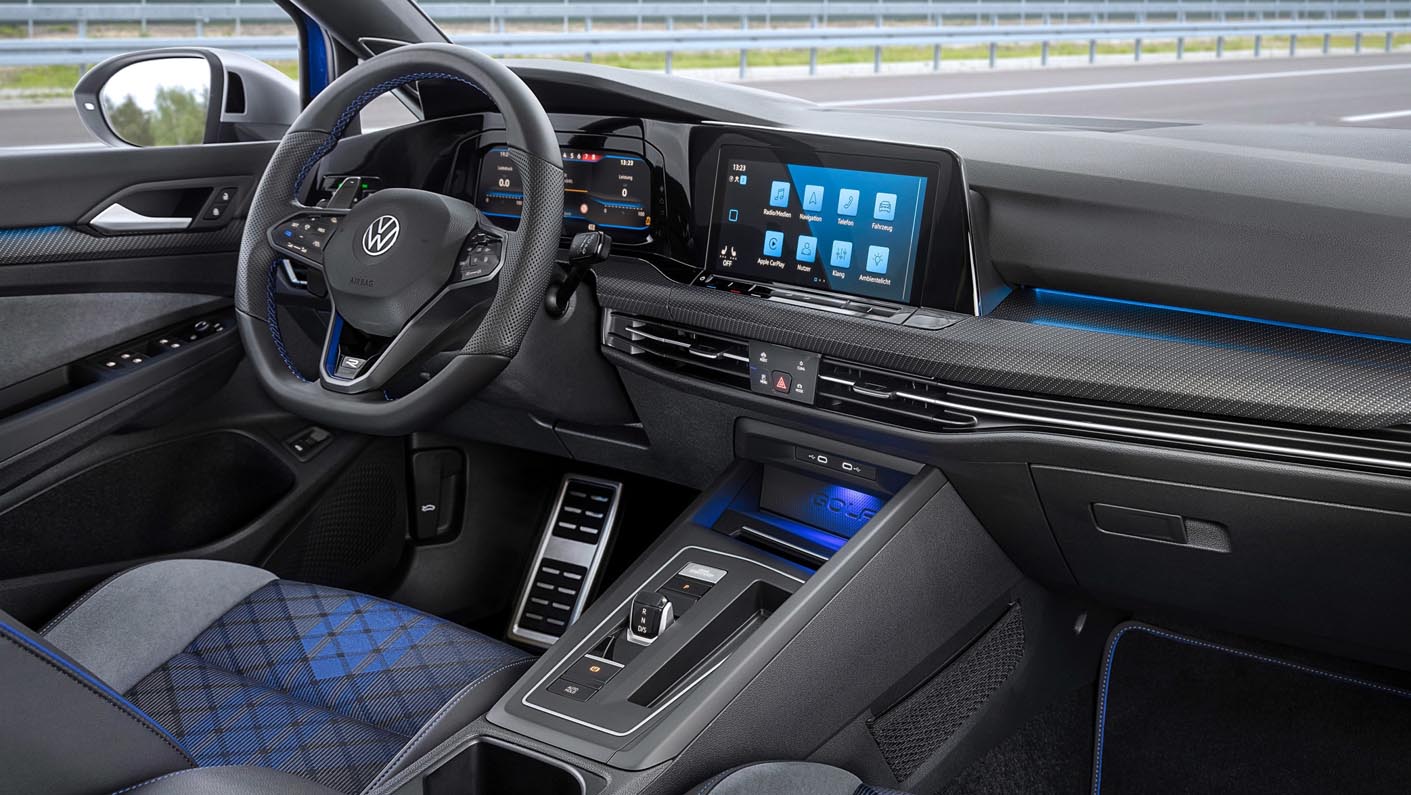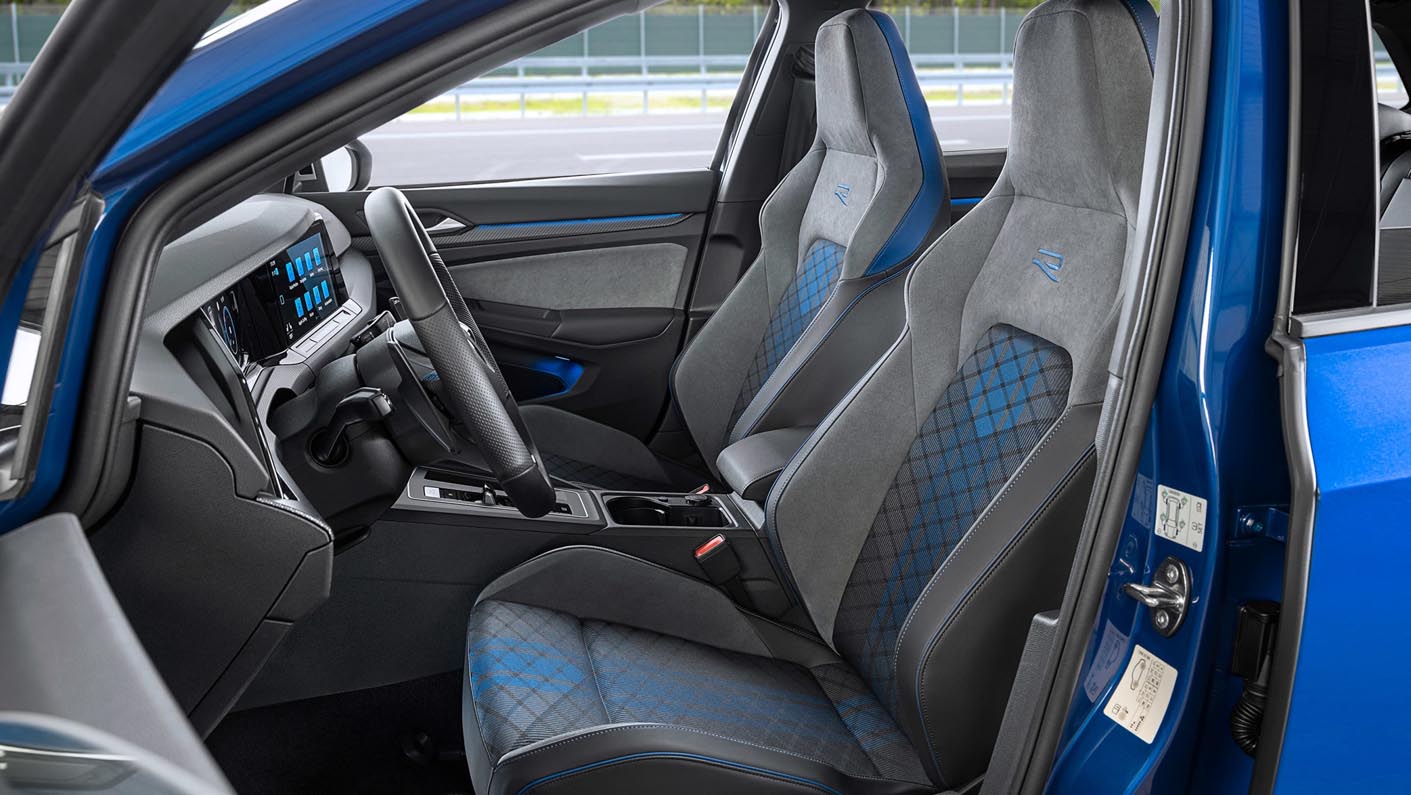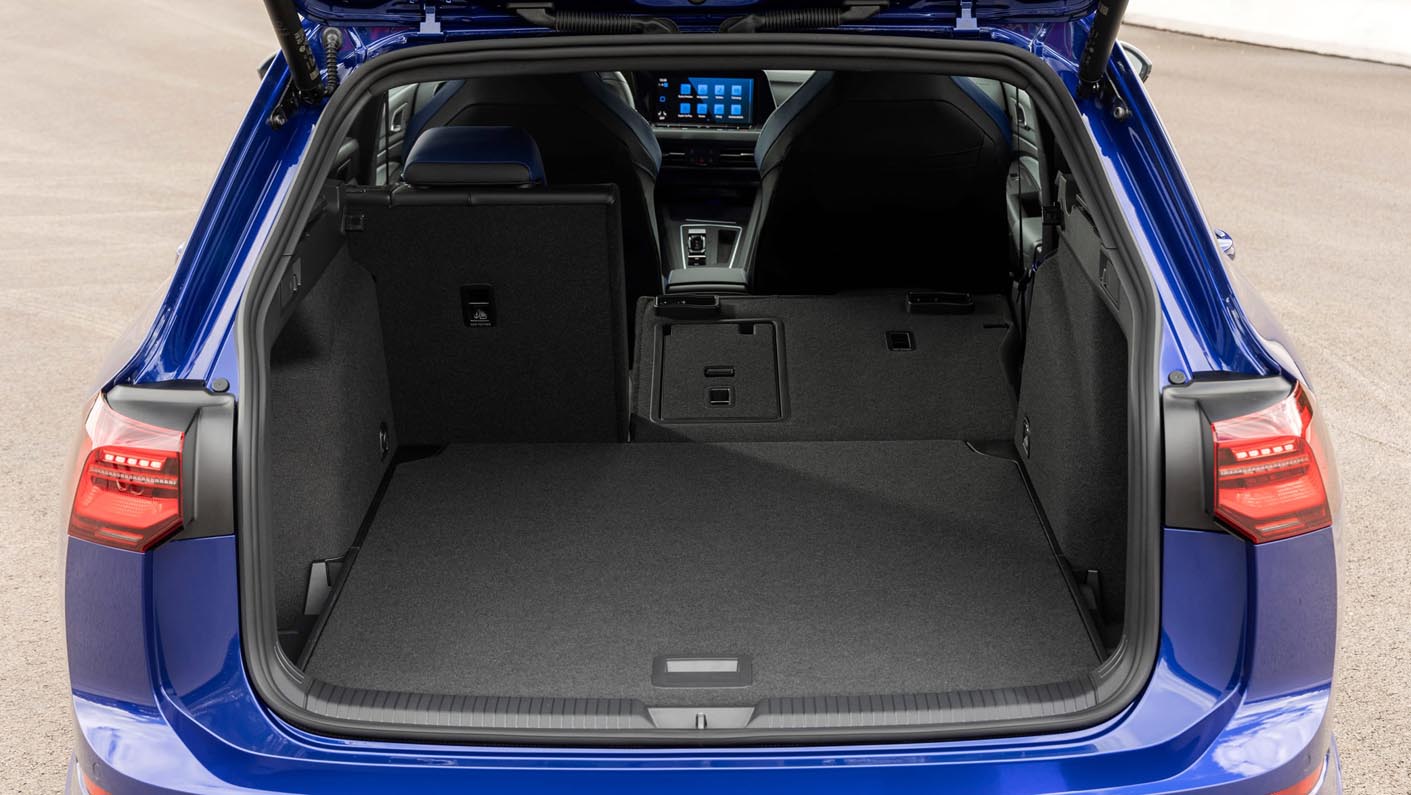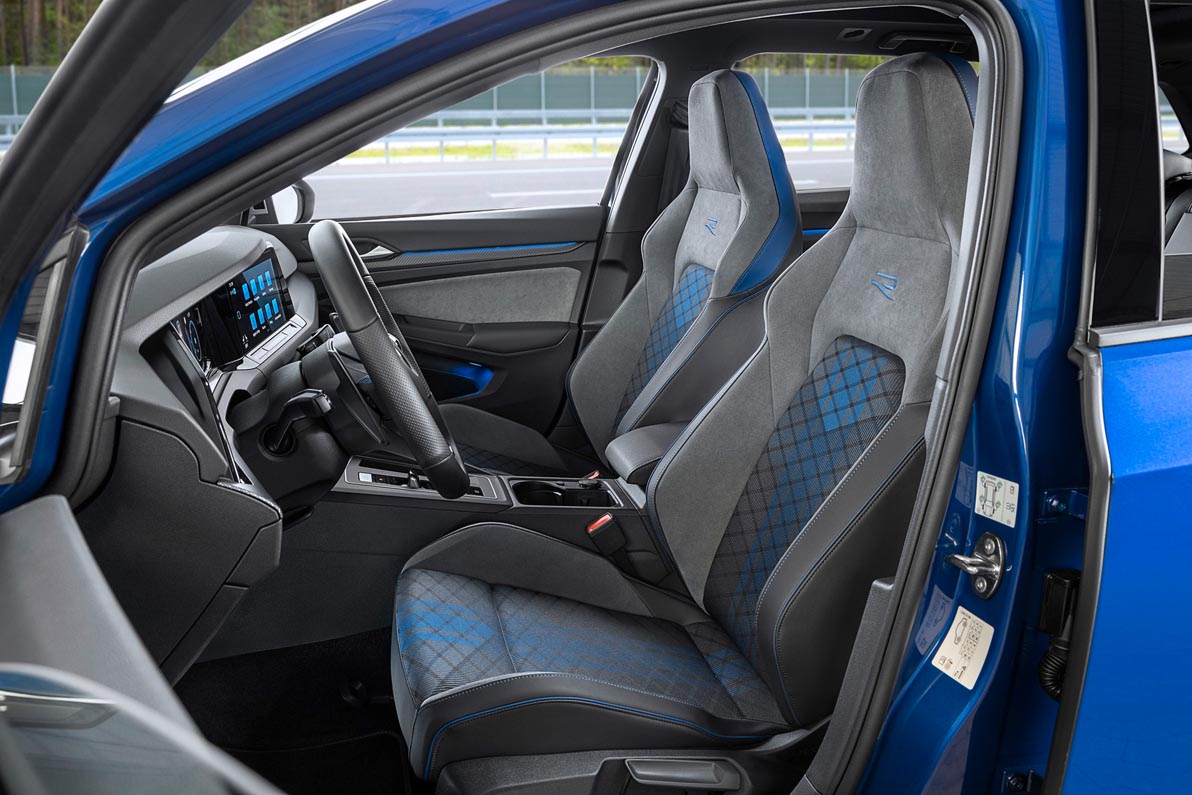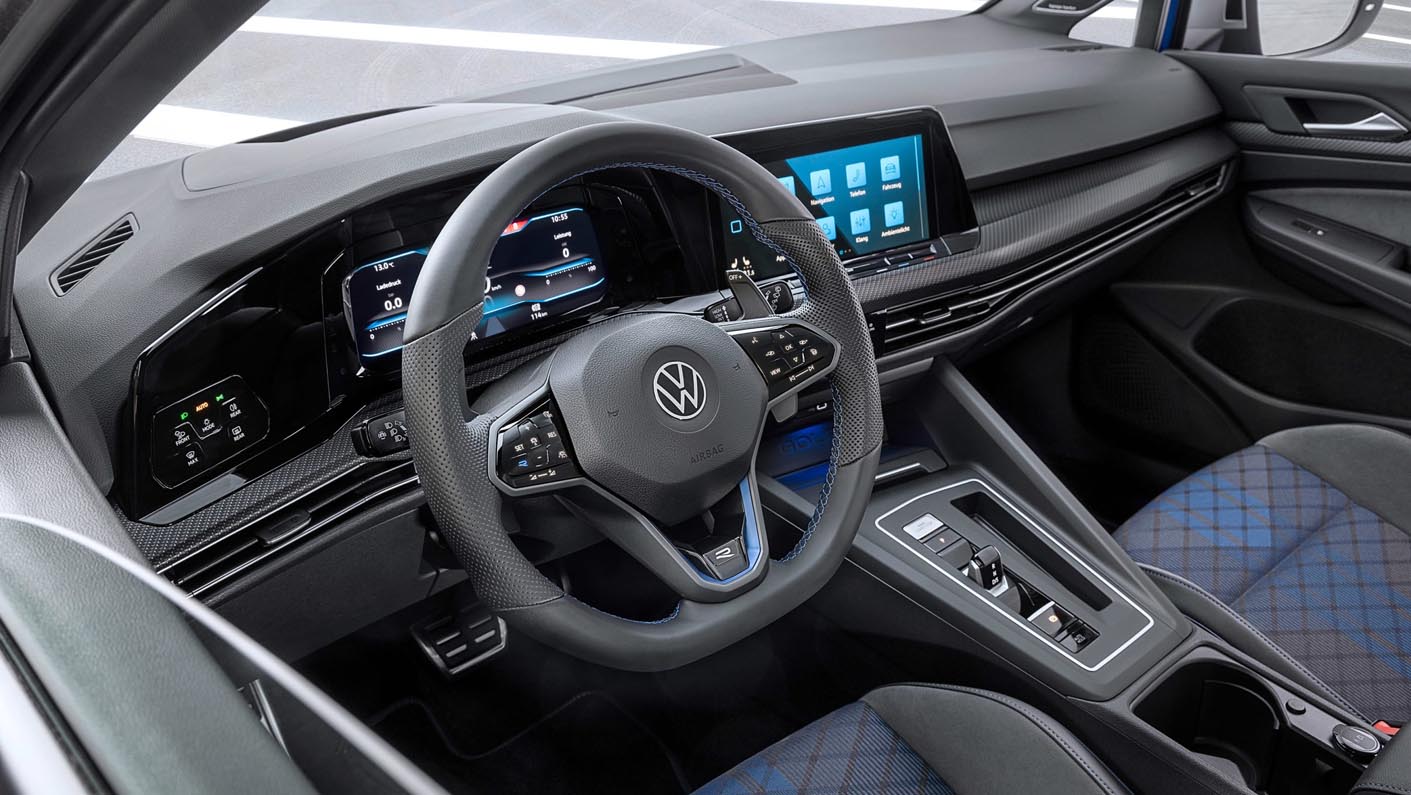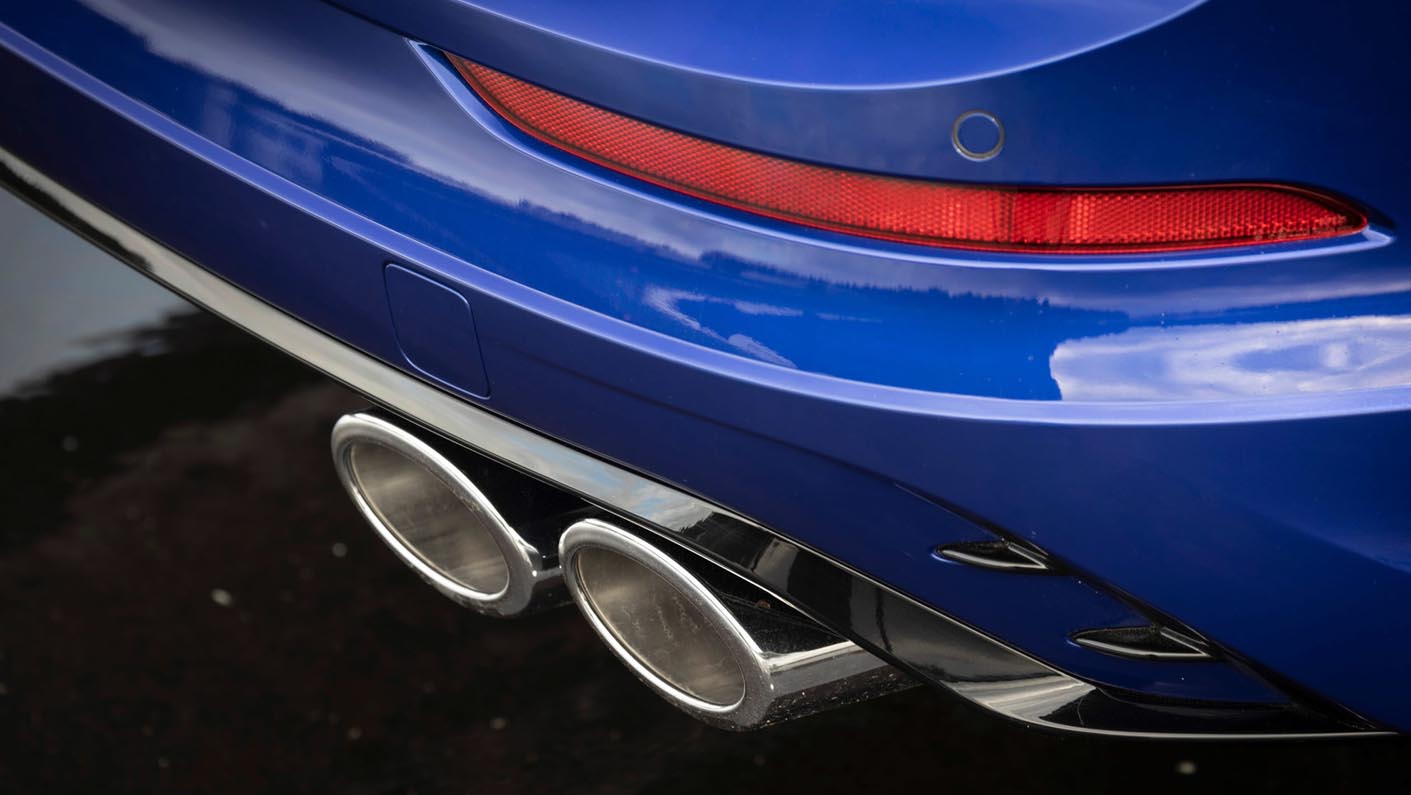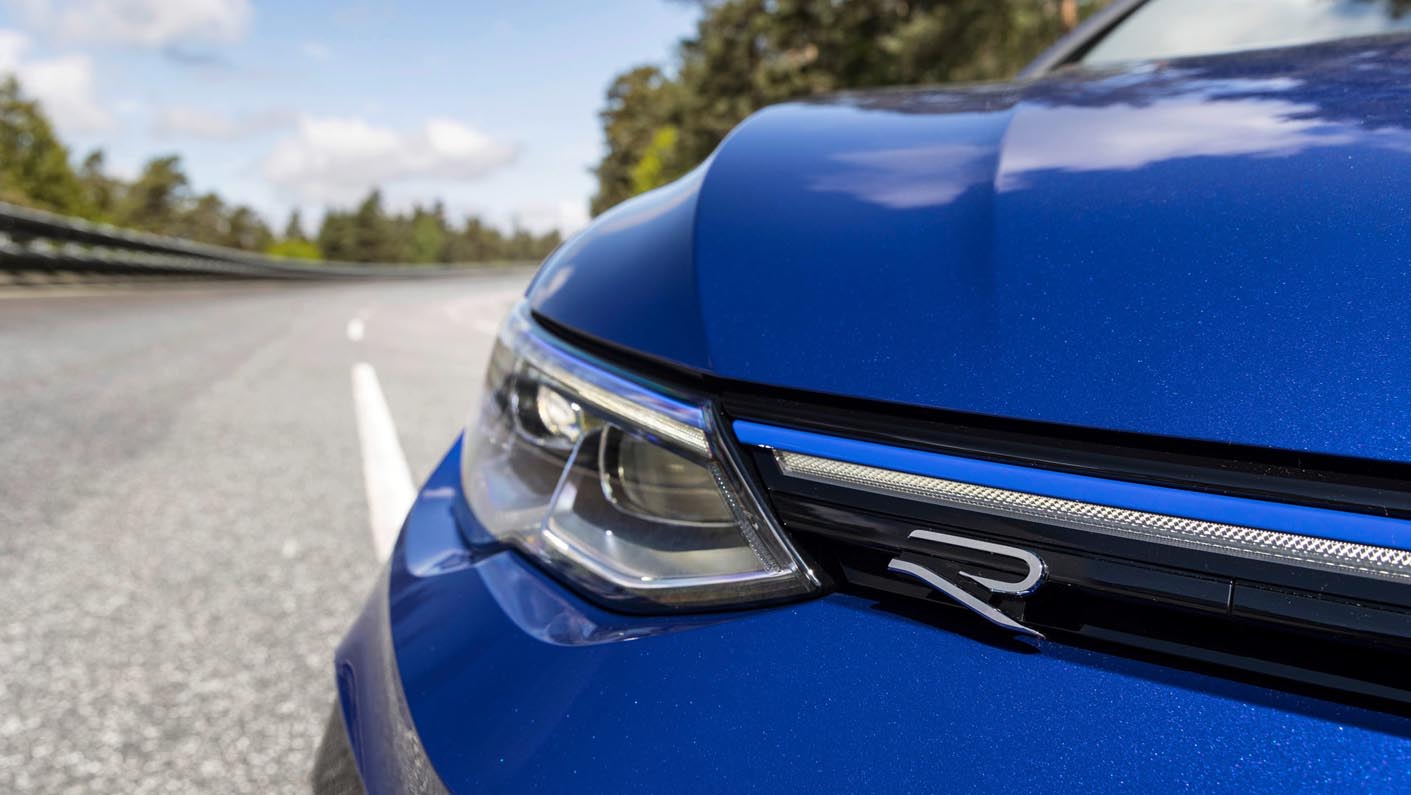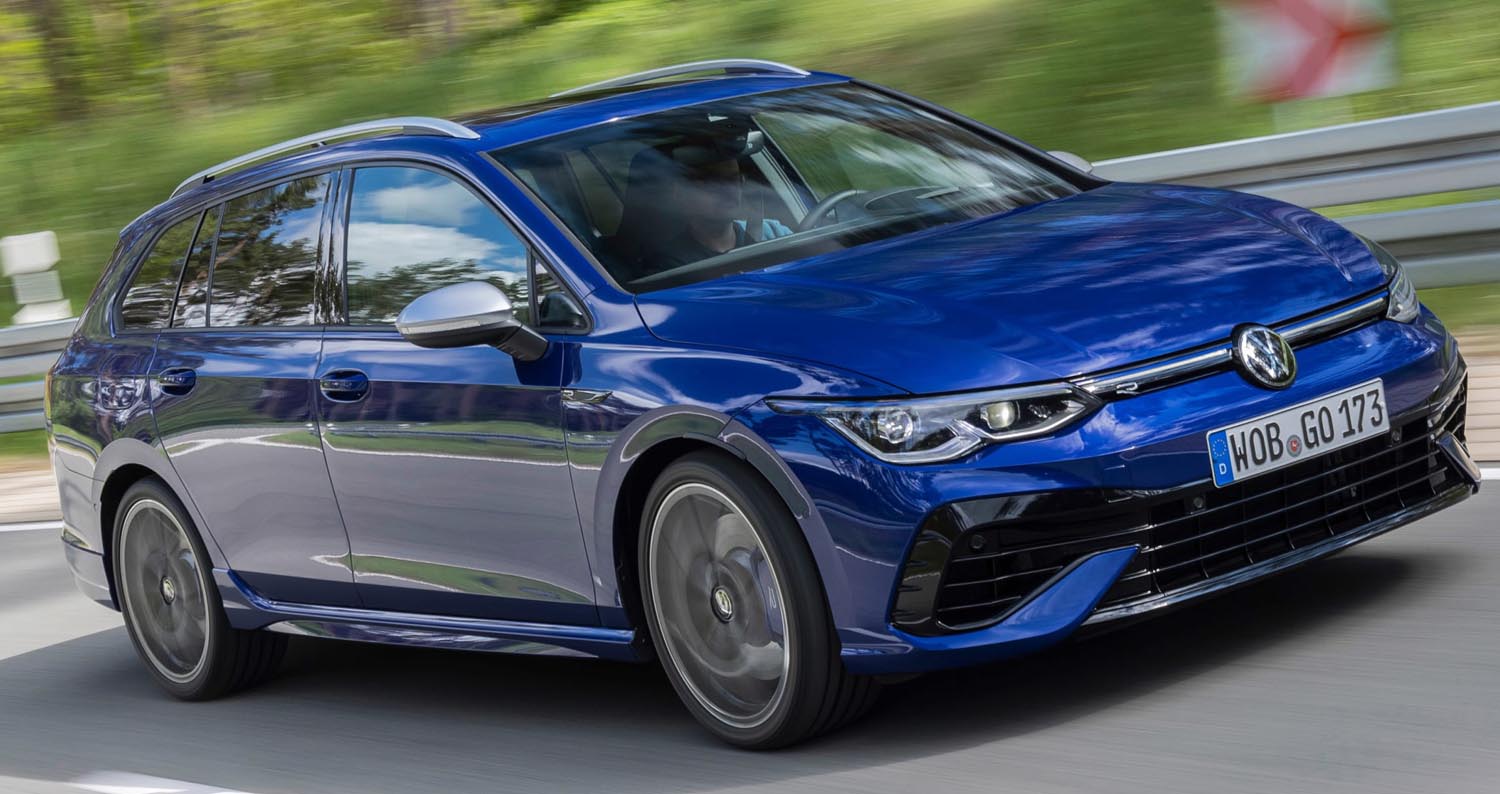
Following the presentation of the Golf R, a thoroughbred sports hatchback, Volkswagen is has introduced the next variation on its high-end Golf model: the VW Golf R Estate. Blending high performance with the flexibility offered by a large luggage compartment volume, this second-generation model is the ideal sports estate. With an output of 235 kW (320 PS), the new Golf R Estate is the most powerful and dynamic of all Golf estate models. More performance, more longitudinal and lateral acceleration, more innovations, more space and more emotional impact make this car better than ever. The all-wheel drive 4MOTION with R Performance torque vectoring, which comes as standard, is supplied with a maximum torque of 420 Nm by the 2.0 TSI. An exceptionally fast 7-speed dual clutch gearbox is responsible for power transmission. And the new Volkswagen Golf R Estate accelerates to 100 km/h in just 4.9 seconds. The top speed is electronically limited to 250 km/h. Optionally, the Golf R Estate can also be ordered with the R Performance Package, which increases the top speed to 270 km/h. The R Performance Package also includes 19-inch wheels instead of the standard 18-inch versions and the additional driving profiles Special (Nürburgring mode) and Drift (for power slides).

4MOTION with R Performance torque vectoring
Like the compact Golf R, the Golf R Estate features the newly developed all-wheel drive system with selective wheel torque control on the rear axle. Here, a new rear final drive distributes the drive power not just between the front and rear axles as needed, but also between the rear wheels. This significantly increases the agility of the Volkswagen Golf R Estate, particularly when cornering. The all-wheel drive is also networked via the Vehicle Dynamics Manager (VDM) with other running gear systems such as the electronic differential locks (XDS) and adaptive chassis control DCC. The result: optimum traction characteristics, neutral handling with the utmost level of precision, exceptional agility. Maximum driving pleasure.
Extra profiles for the Nürburgring and drifting
Like the Golf R, the Golf R Estate was fine-tuned on the Nordschleife of the Nürburgring. If ordered with the optional R Performance Package, the performance estate car comes with its own driving profiles, Special and Drift. In the profile Special, the main drive system parameters are configured for the Nordschleife and other similarly demanding courses – including for the first time the 4MOTION all-wheel drive with R Performance torque vectoring. Away from public roads, the driving profile Drift opens up a whole new level of driving dynamics and makes drifting much safer and more fun.
Spacious vehicle interior
The Golf R Estate may be exceptionally sporty, but it also retains all the characteristics you’d expect from a Golf estate: this is a comfortable leisure-oriented and family-friendly estate car for all walks of life. The Volkswagen Golf R Estate is supremely suited to everyday driving, and this is in no way compromised by its highly sporty design. On the contrary. “It represents the perfect combination of a compact Golf R and an estate. Sportiness, performance and emotional impact meet space, variability and innovation,” says Sven Smeets, Head of the R Business Unit. With a loading capacity of 611 litres plus five usable seats, or a maximum luggage volume of 1,642 litres when loaded to roof height, the Golf R Estate gets the whole family and all their luggage to where they want to go – quickly, safely and comfortably. “Thanks to the optional comfortable running gear and intelligent comfort and assist systems, the Golf R Estate is also well-equipped for long-distance driving,” says Sven Smeets. For the first time, the Golf R Estate is available with an optional ball coupling with a permitted maximum trailer weight (braked) of up to 1.9 tonnes and a drawbar load of 80 kilograms.
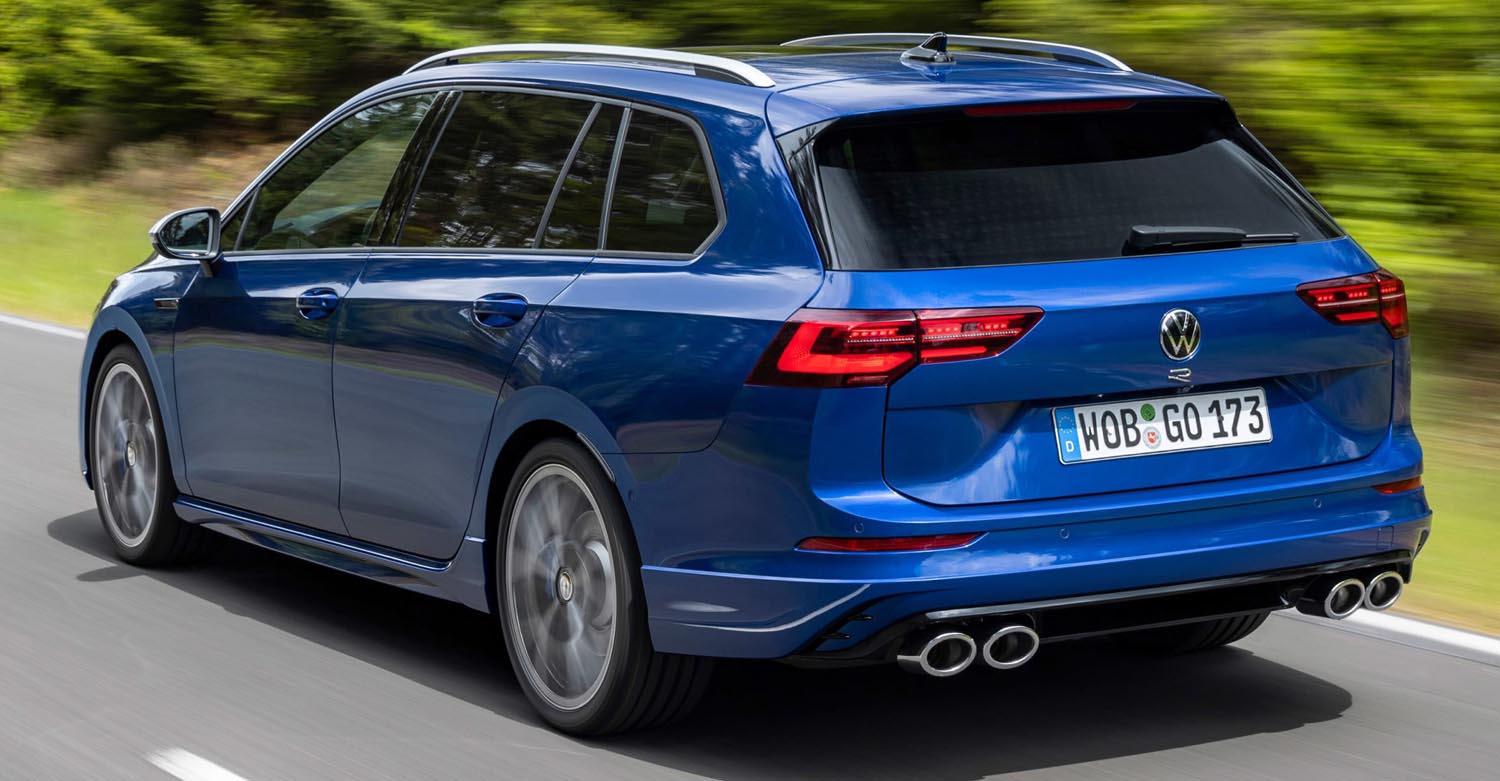
The TSI engine
A true sports estate like the new Volkswagen Golf R Estate needs a powerful heartbeat, and for that, it has to be fitted with the best components. This applies without restriction to the legendary TSI from the EA888 product line in its fourth incarnation: As an evo4, the 1,984 cm3 four-cylinder turbocharged engine now develops an output of 235 kW (320 PS). That’s 14 kW (20 PS) more than the predecessor (third-generation) engine. The maximum torque has increased from 400 Nm to 420 Nm. This is available even at low engine speeds of just 2,100 rpm and remains constant at this high level up to speeds of 5,350 rpm. Integrated into the cylinder head of the direct-injection engine is a system for water-cooled exhaust gas recirculation to the turbocharger.And the TSI is economical too – a fully electronic coolant regulator unit enables very efficient thermal management with a short warm-up phase. Consumption in accordance with NEDC is just 7.3-7.2 l/100 km combined. The TSI also features variable valve timing with double camshaft control. The new engine complies with the latest Euro 6d-ISC-FCM emission standard, in part thanks to the valve lift, which can be switched between two levels on the exhaust side. This allows optimum control of gas exchange with respect to performance, consumption and exhaust emissions. The 320-PS TSI’s impressive power is transmitted to all four wheels by a 7-speed DSG.
The 7-speed dual clutch gearbox (DSG)
The new Golf R Estate is equipped as standard with the latest development stage of Volkswagen’s 7-speed DSG.The dual clutch gearbox is designed for high torque forces and offers excellent shifting performance without interrupting traction. This is thanks to the DSG’S sophisticated design. The dual clutch gearbox consists of two automated gear train halves, each with a clutch. One gear train half is for the even gears, the other for the odd gears. Both gear train halves work together on the same gearbox output. For example, if the vehicle is in fourth gear, the third or fifth gear is automatically pre-selected via the second gear train half. If the driver now accelerates or decelerates, one clutch closes at lightning speed while the other opens. This enables gear changes to be made within a few hundredths of a second, making it a key element of the sophisticated construction that is the high-performance Golf R Estate. Gear shifts are likewise fully electronic (shift-by-wire). On the one hand, this allows for a gear knob that is much smaller, thus saving space. On the other hand, it makes changing gear more comfortable for the driver. For example, thanks to shift-by-wire, the vehicle can already engage reverse while it is travelling forwards at low speeds, which facilitates manoeuvring. The Golf R Estate does not make its smooth shift to “R” until the speed is right. In this way, the electronics system prevents incorrect operation.
4MOTION all-wheel drive with R Performance torque vectoring
The new all-wheel drive system makes a central contribution to the impressive performance of the Volkswagen Golf R Estate. Thanks to a newly developed rear final drive, the drive power is distributed not only variably between the front and rear axles, but now also just as variably between the left and right rear wheels. This is how it works: The differential transfers the power via a multi-plate clutch to the left- and right-hand rear wheels with a ratio of 50:50 – even when the differential lets them rotate at different speeds while cornering.
The way the 4MOTION all-wheel drive works is likewise familiar from other Volkswagen models manufactured on the basis of the modular transverse matrix (MQB). A new feature is that the torque is now also distributed variably across both rear wheels courtesy of the 4MOTION all-wheel drive with R Performance torque vectoring.In extreme cases, up to 100 percent of the potential power can be transmitted to the wheel on the outside of the bend. This clearly reduces the vehicle’s cornering radius, whilst at the same time reducing the danger that the Golf R Estate moves towards the outside of the bend if the driver turns into bends at speed (understeer). The intensity of the automatic power distribution is determined by the steering angle, accelerator pedal position, lateral acceleration, yaw rate (speed of rotation on the vertical axis) and speed at which the vehicle is being driven. The result is noticeably more agile driving behaviour. This agility is perfectly complemented by the new Golf R Estate’s progressive steering (which comes as standard) and the stabilising driving dynamics systems from the standard driving profile selection (Comfort, Sport, Race and Individual) to the profiles Special and Drift in the optional R Performance Package, as well as the (optional) adaptive DCC sports running gear. In addition, the Vehicle Dynamics Manager, fitted in the Golf R Estate for the first time, ensures that the all-wheel drive system is closely integrated with the adaptive chassis control DCC, the electronic differential locks (XDS) and the progressive steering.
Perfected front and rear axle
In keeping with the enormous power of the new sports estate model, Volkswagen has specifically adapted the running gear the Golf R Estate. The sports running gear primarily lowers the body by 20 millimetres as compared to the Golf Estate. The engineers were confronted with the challenge of striking a balance between exceptional performance and optimum ride characteristics. The running gear consists of a McPherson axle at the front and a four-link axle at the rear. Both the spring rates and stabiliser rates have been increased by 10 percent as compared to the predecessor model. The set-up of the adaptive chassis control DCC has also been adjusted accordingly by modifying the system hydraulics and parameterisation. In order to allow for higher cornering speeds and improved lateral control, the engineers increased the negative camber at the front (-1°20′). This also enabled significantly more neutral handling when accelerating. At the same time, the experts managed to reduce the weight of the aluminium subframe by three kilos and make it even stiffer. The rear axle was also adapted to the sporting ambitions of the Volkswagen Golf R Estate by means of modified transverse link mounts and hub carriers. The balanced axle load distribution is also a major factor in terms of the excellent controllability of the Golf R Estate. It is six percent better in the Golf R Estate (relative to the ideal of 50:50) than in the Golf R. The sporty estate model also performs better in terms of drag coefficient: the cW value of the Golf R Estate is another four percent lower than that of the elaborately aerodynamically optimised Golf R.
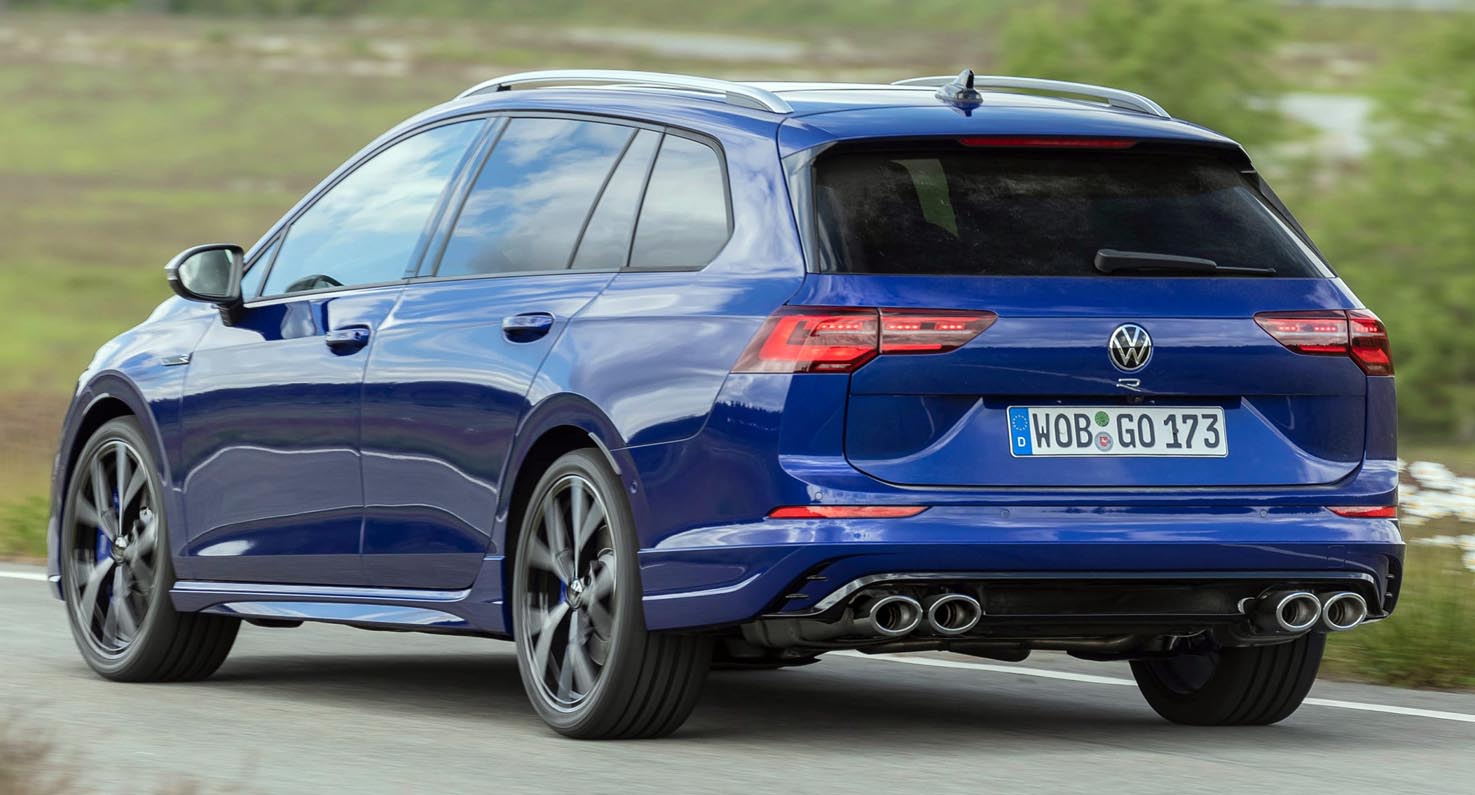
Progressive steering
The Volkswagen Golf R Estate benefits from progressive steering as standard. In the new sports estate car, this reaches a whole new evolutionary stage as it is now designed to be even more direct based on new software algorithms and a new software application. While conventional steering systems work with a constant transmission ratio, the transmission ratio here is progressive. Advantage: When manoeuvring and parking, firstly there is a noticeable reduction in steering effort, and secondly less hand and arm movement is required of the driver. Thirdly, the more direct design results in increased driving dynamics in particular, especially on winding roads and when turning. In other words: the yaw response here demonstrates a higher degree of linearity right up to high speeds – this is something the driver notices all the time, and there is also more “road feedback” when cornering. Technically, this works based on variable gearing of the rack and pinion as well as a more powerful electric motor in the basic steering system. Unlike in systems with a fixed steering ratio, which are always forced to compromise between driving dynamics and comfort, the teeth of the steering rack vary significantly over the range of the steering movement.
The Vehicle Dynamics Manager
Volkswagen uses a new driving dynamics control system in the new Golf R Estate and in the new Golf R – the so-called Vehicle Dynamics Manager. In the Golf R, the intelligent system not only closely integrates the electronic differential locks (XDS) and lateral dynamics-related elements of the optionally controlled shock absorbers in the adaptive chassis control system (DCC), but also – for the first time – the 4MOTION all-wheel drive system with R Performance Torque Vectoring. Electromechanically adjustable running gear systems once again significantly enhance the balance between maximum dynamics and the highest levels of comfort. The Vehicle Dynamics Manager coordinates the electromechanical functions of the all-wheel drive system, the electronic differential locks (XDS), and the lateral dynamics-related elements of the regulated shock absorbers (DCC) during every driving manoeuvre. The result is an adjustment of wheel-specific damping for particularly agile and precise handling.
Targeted braking interventions
The Vehicle Dynamics Manager also enables exact calculation of perfect clutch control for the selective wheel torque control function to further optimise the agility and stability of the Golf R. In parallel to this, targeted braking intervention on the vehicle side on the inside of a bend also further reduces understeer in the transition and limit ranges. In addition, the controlled dampers are capable of minimising body roll; by linking DCC and 4MOTION with R Performance Torque Vectoring, the sports estate model responds more quickly to even the slightest steering movements. Meanwhile, traction is improved by an increased locking torque in the selective wheel torque control. As a result, Understeer – something that is rather unpopular with sports drivers – is minimised. If a driving manoeuvre causes the Golf R Estate to understeer too heavily on a corner and results in the front end being pushed outwards – for instance during spontaneous acceleration ahead of the apex of the bend – the Vehicle Dynamics Manager closes the selective wheel torque control clutch on the wheel located on the outside of the bend. This creates a yaw moment at the rear axle, enabling the sports estate car to turn neutrally into the bend. The control of the Vehicle Dynamics Manager also optimises yaw and load change damping at high speeds via 4MOTION with R Performance Torque Vectoring and DCC.
Adaptive shock absorbers
Adaptive chassis control DCC is optionally available for the new Golf R Estate. This system continuously reacts to the road surface and driving situation while taking into account steering, braking and acceleration manoeuvres, for example. The lateral dynamics components of the DCC chassis are coordinated and optimised with the help of the Vehicle Dynamics Manager. By means of the set driving profile, the driver can influence the reduction in body motion as desired. The required damping is calculated for each wheel 200 times per second before it is adjusted at the four shock absorbers. The result: optimum driving dynamics and the best possible ride comfort in all situations on the road. The conventional and DCC running gear are explicitly designed for the Volkswagen Golf R Estate with its extended wheelbase and distinctly sporty axle load distribution.
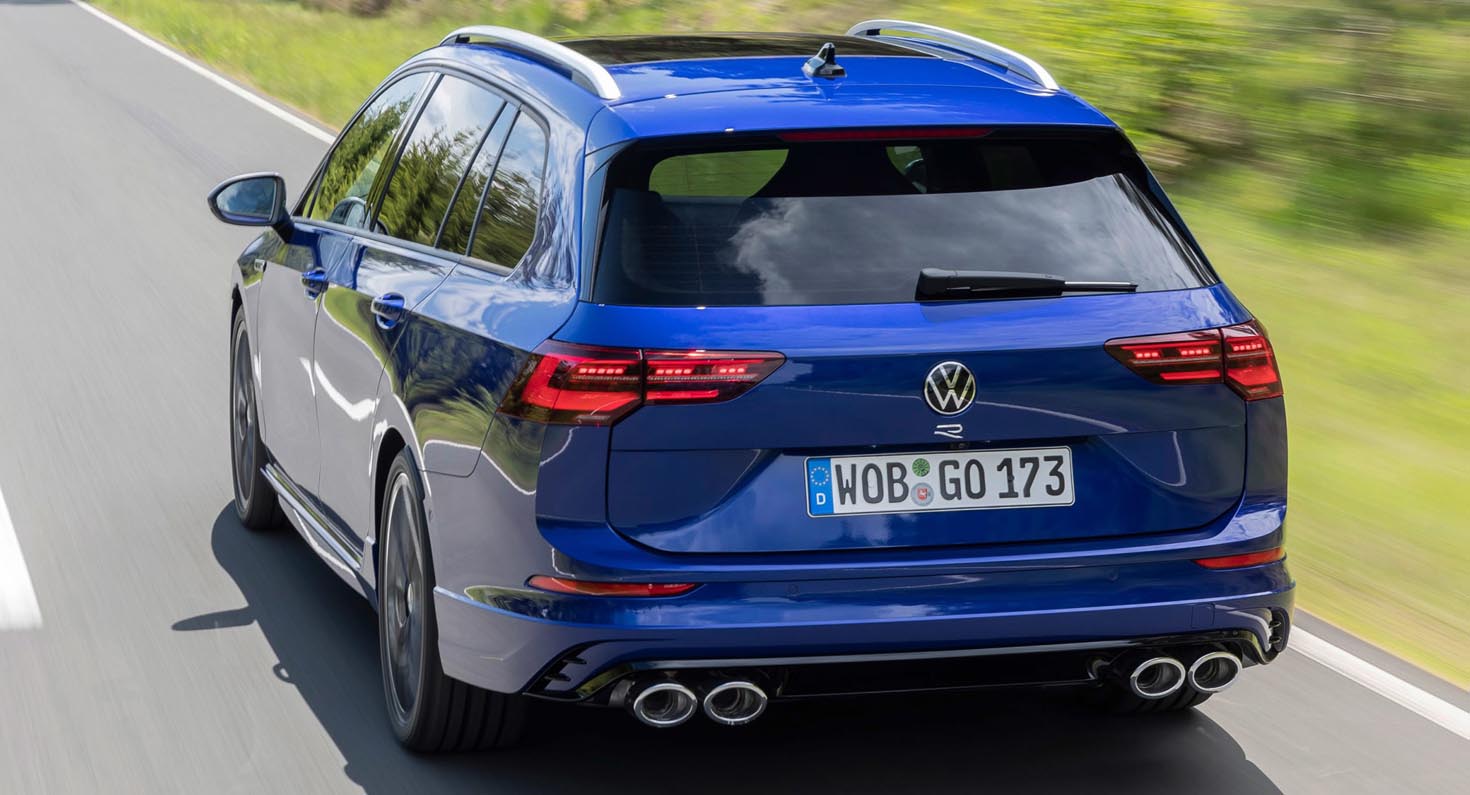
A total of six driving profiles
The driving profiles Comfort, Sport, Race and Individual are available as standard in the Golf R Estate. The optional R Performance package includes the Special and Drift extended profiles. The Comfort profile is fully designed for optimum comfort in terms of the parameters of the engine, transmission, shock absorbers, steering and R Performance Torque Vectoring, while the ESC operates without restriction. Sport is the basic mode of the Golf R Estate: here all parameters are geared towards a sporty response. In the Race profile, all connected systems are even more incisive, but ESC is fully active (as in Sport and Comfort too). The coasting function (freewheeling without drive power) is switched off, however. In the Individual profile, the driver can precisely adjust and save their own driving profile using a digital slider. ESC is always activated when the engine is started and a button allows the driver to adjust it to their needs at two levels. In the submode ESC Sport, the ESC thresholds and ASR slip thresholds are increased to reduce the intensity of interventions. In ESC Off mode, experienced drivers can additionally deactivate ESC altogether for all driving situations. However, Front Assist and Swerve Assist reactivate the full ESC system in emergencies. The two additional driving modes included in the optional R Performance package are profile extensions of Race. Among other things, they ensure optimum traction on demanding race tracks such as the Nürburgring-Nordschleife (Special) and simplified drifting for all those who enjoy it.
18-inch brake system
The Estate R can reach speeds of up to 270 km/h and weighs just 1,630 kilograms, so it requires reliable and supreme deceleration when needed. At the front there is a new brake system with 18-inch discs – one inch (25.4 millimetres) larger than the brake discs in the predecessor model. The change in disc dimensions is from 340 x 30 millimetres to 357 x 34 millimetres. The new brake is built with pin discs and a brake pot made of aluminium, which reduces the weight by 600 grams on each side. A speed-dependent map in the electromechanical brake servo ensures precise brake control. When manoeuvring, the brakes respond particularly harmoniously; at high speeds, they are spontaneous and vehement, as desired. Thanks to precise optimisation in the high brake pressure range, the new brakes still permit very exact control even just before ABS intervention. This is due in no small part to the now larger brake master cylinder, which ensures a crisp yet refined response combined with sporty, short pedal travel which the driver definitely notices subjectively.
More technology and visual features
Optimum and optional: anyone wishing to give the look of the new Golf R Estate an even more stylish touch than it already has ex works can order the R Performance package. This upgrades the Golf R Estate visually with larger wheels as well as offering technical benefits.
The Special and Drift profiles
Specifically designed for the Nürburgring-Nordschleife, the Special profile gives the car a set-up that meets the distinctive requirements of what is probably the most demanding race track in the world. Part of this is that the shock absorbers are set to Comfort – for optimum road contact – because of the enormous strain that occurs during peak performance on this type of natural track. The adaptive chassis control system DCC also has a special vertical set-up here. By means of the Vehicle Dynamics Manager and selective wheel torque control, a special transverse dynamic set-up is also achieved for optimum cornering on the Nürburgring. The downshifts in automatic DSG mode perfectly match every initial braking manoeuvre going into the bends, according to brake pressure. The current gear is also maintained depending on the lateral acceleration and the speed at which the accelerator is released (“fast off”). In manual DSG mode, the otherwise usual forced upshifts no longer apply. For the turbocharged engine, this means that the load changes are adjusted in order to optimise steering response and lateral dynamics. In addition, engine speed is increased to improve set-off performance and the accelerator pedal characteristics have been given a new set-up for optimum control (this function – called Sport+ – is only available in Special and Drift). Steering and 4MOTION with R Performance Torque Vectoring are programmed to Race, while ESC is fully activated.
In Drift, the set parameters for the ESC control (automatic change to ESC Sport) and the distribution of power via the all-wheel drive system enable drifting (Drift setting in 4MOTION with R Performance Torque Vectoring). To ensure that the profile is only selected on private roads, the infotainment system always displays a confirmation prompt before it is activated. Those feeling particularly confident can of course entirely deactivate the ESC function in the Volkswagen Golf R Estate if they wish.
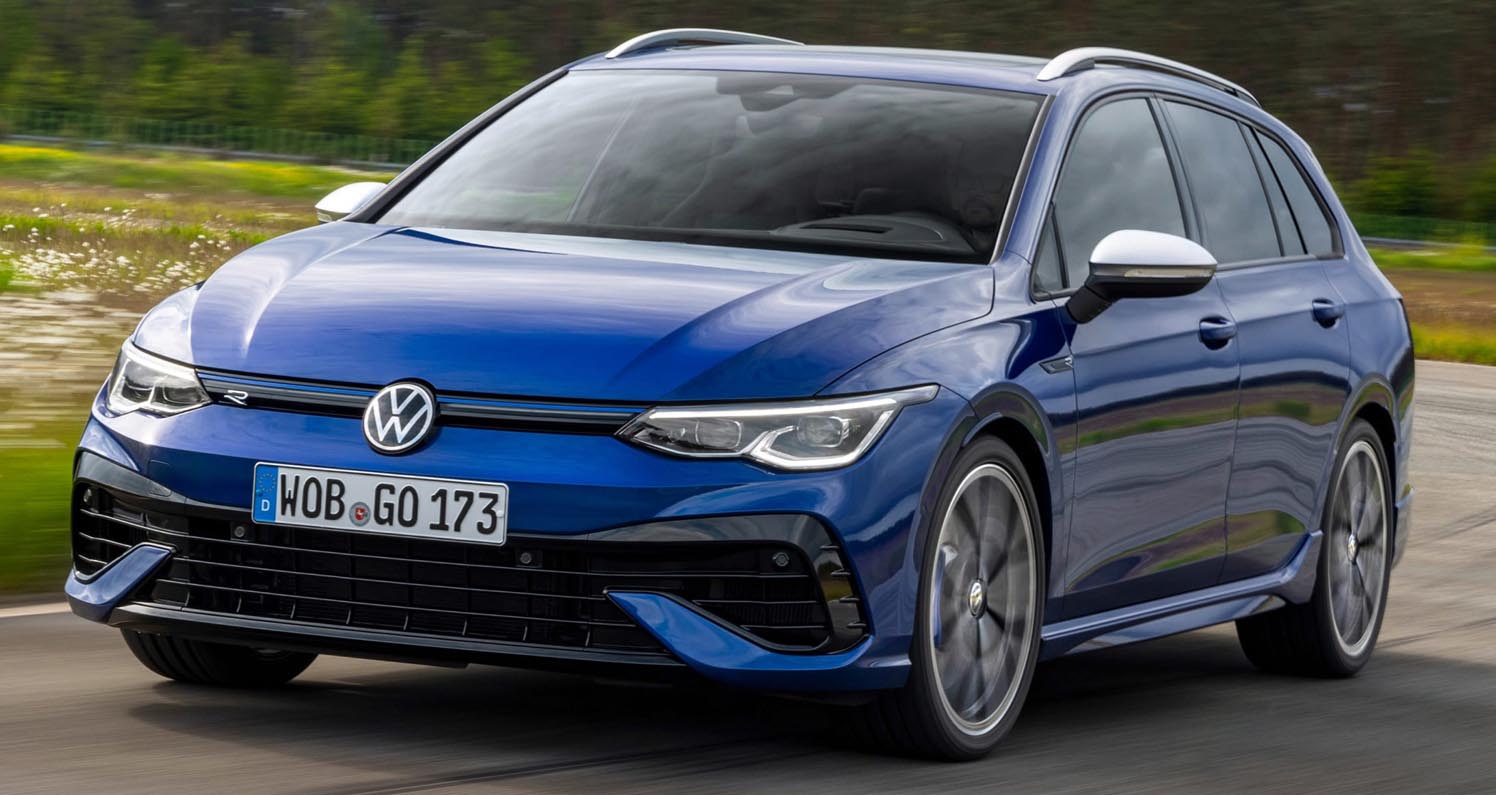
Higher maximum speed
A standard top speed of 250 km/h is more than enough for most roads – but there are some customers who enjoy the option of being able to drive even faster. This is what the R Performance package provides: it includes the removal of the electronic speed limit of 250 km/h, allowing a top speed of 270 km/h.
The 19-inch Estoril wheel
The optional R Performance packagealso includesthe Estoril wheel model in the size 8Jx19 with 235/35 R 19 tyres. The spokes here are optionally burnished, with the inner surfaces in black for a sporty, refined contrast, or else there is the option of a complete black finish.
Assistants for everything
Based on Volkswagen’s MQB, the new Golf R Estate sets a new benchmark in terms of safety and comfort. Standard features include the lane departure warning system Lane Assist, the Autonomous Emergency Braking with City Emergency Braking function and pedestrian detection, the new turn-off assist, the Driver Alert System and the electronic differential lock XDS. Also included ex works are the Digital Cockpit Pro (digital instruments), the infotainment system Ready 2 Discover with 10.0-inch touchscreen, a new multifunction sports steering wheel, the Air Care Climatronic automatic climate control system, the Keyless Start system, a Bluetooth telephone interface and top-of-the-range sports seats as well as LED Plus headlights and LED tail light clusters including automatic headlight control. A new oncoming vehicle braking when turning function and the also new Car2X warning system considerably improve safety. Travel Assist enables assisted driving at speeds of up to 210 km/h, thereby enhancing travel comfort and therefore safety, too. In addition, the new Golf R Estate comes with the new IQ.LIGHT – LED matrix headlights as an option.
Wheels and tyres
18-inch alloy wheels are provided as standard, with 19-inch wheels available as an option. In addition to the 19-inch alloy Estoril wheel, which is included in the R Performance package, the Adelaide wheel (8Jx19, 235/35 R 19, burnished spokes and interior surfaces in black) is also available in the size of 19 inches. Also on offer: the 18-inch Bergamo winter wheels and 19-inch semi-slicks (tyres) for drivers who primarily wish to drive their Golf R Estate on race tracks.
The seats
The new Volkswagen Golf R Estate comes as standard with top-of-the-range front sports seats including integrated head restraints and blue R logos on the front seat backrests. The seat centre panels are covered with the fabric seat covers “R” in black-blue. The inner side of the seat cushion bolsters is made of ArtVelours microfleece in Flint Grey. As an option, the new Golf R Estate can be ordered with the Nappa leather package including carbon look elements with blue applications in the side area. These seats come with active climate control and a blue R logo on the front backrests.
Large tilting panoramic sunroof
The Golf R Estate is optionally available with a newly developed, two-part panoramic tilting and sliding sunroof. The glass above the rear passengers is fixed; at the front, the translucent section can be lifted and moved to the rear via a touch slider in the headliner. In order to minimise noise from air turbulence at higher speeds, the open roof can be automatically closed a little more as the speed increases by briefly tapping the touch slider.
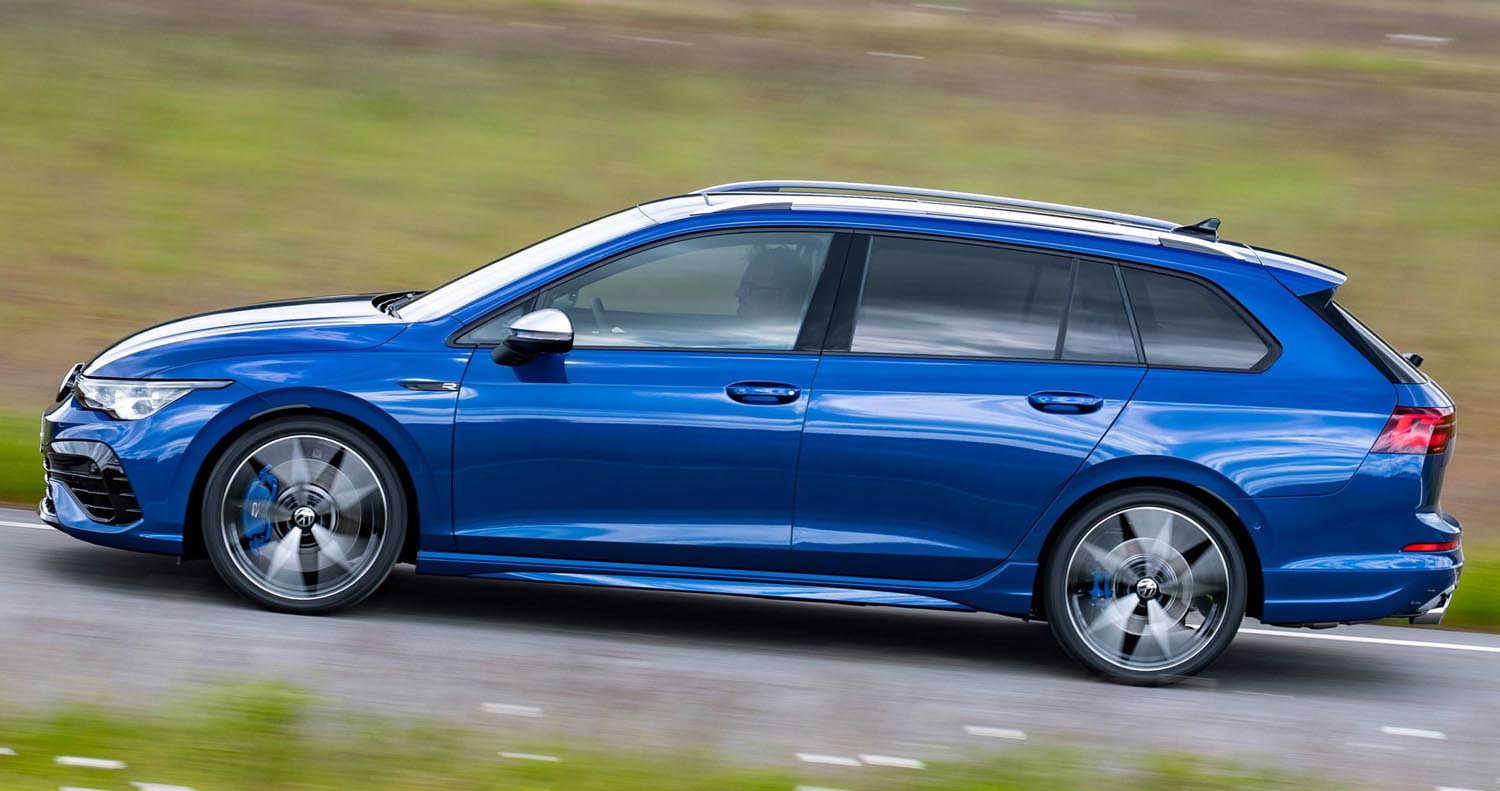
New functions available with the optional Climatronic
The optional 3-zone automatic climate control (Climatronic) offers new functions: Smart Climate can be used to launch preconfigured air conditioning functions – “Clear screen”, “Warm feet”, “Warm hands”, “Cool feet”, and “Fresh air” – from the screen or via voice control.
The front
A powerful drive and best driving dynamics make for a muscular and superior appearance. Like the Golf R, the Golf R Estate optically distinguishes itself in the front with an R-specific bumper with splitter and side wings as large air guide elements (painted in exterior colour). Among other things, the Volkswagen Golf R Estate sports a blue strip in the upper cooling element. This LED strip in the Golf R Estate is illuminated for the first time, as with the Golf R, and extends into the wing on the side as daytime running lights. This iconic design feature is activated every time the engine is started. Applications in high-gloss black and the R-specific ventilation grille – characterised by a wide horizontal, high-gloss black cross pieces – will certainly leave no doubt that this Estate is part of the R family. Below the LED light strip, standard LED headlights illuminate the road perfectly. On the right in the radiator grille, the R logo indicates that this Estate is part of the family of elite sports estate cars.
The sides
The powerful four-door vehicle has an unobtrusive yet deliberately muscular look from the side. As standard, the Golf R Estate has 18-inch Jerez alloy wheels (7.5Jx18 for tyre size 225/40 R 18), named after the legendary race track Circuito Permanente de Jerez in Spain. The Volkswagen designers have also given attention to the brake calipers – a type of sports car business card: the visible components of the brake system are in striking Blue with the R logo on top as an exclamation mark. If you look closely, you will see with your naked eye, that the Golf R Estate is closer to the road than its series brother. The reason for this is that the body is lower by 20 millimetres thanks to the R-specific sports running gear. The powerful impression is reinforced by the exclusive sill extensions that are always in the body colour. The exterior mirror caps are in matt chrome. The mirror housings also provide impressive LED projection of the R logo on the ground when opening and closing the Golf R Estate. The standard roof rail rounds off the elegant look on the top in anodised silver.
The rear
In particular in the lower rear area, the Volkswagen Golf R Estate shows that it is something special. The R-specific rear bumper as well as the striking, R-specific diffuser painted in high-gloss black, that makes it possible to install a towing bracket despite the car’s sportiness, are completely new. Also new is the sports exhaust system built according to R specifications. This means: two chrome-plated twin tailpipes. The R logo is of course essential on the boot lid and can also be found on the front wings and on the radiator grille. Like all current Golf models, the new Golf R Estate is also equipped with LED tail light clusters as standard.
The colours
A Golf in the R family does not always have to sport Lapiz Blue – even if that is mostly the case. Like the Golf R, the Golf R Estate is, of course, available in this brand colour, but there are also two alternatives: Pure White and Deep Black Pearl Effect. As is the case for the famous blue, these are the classic colours for sporty Golf models.
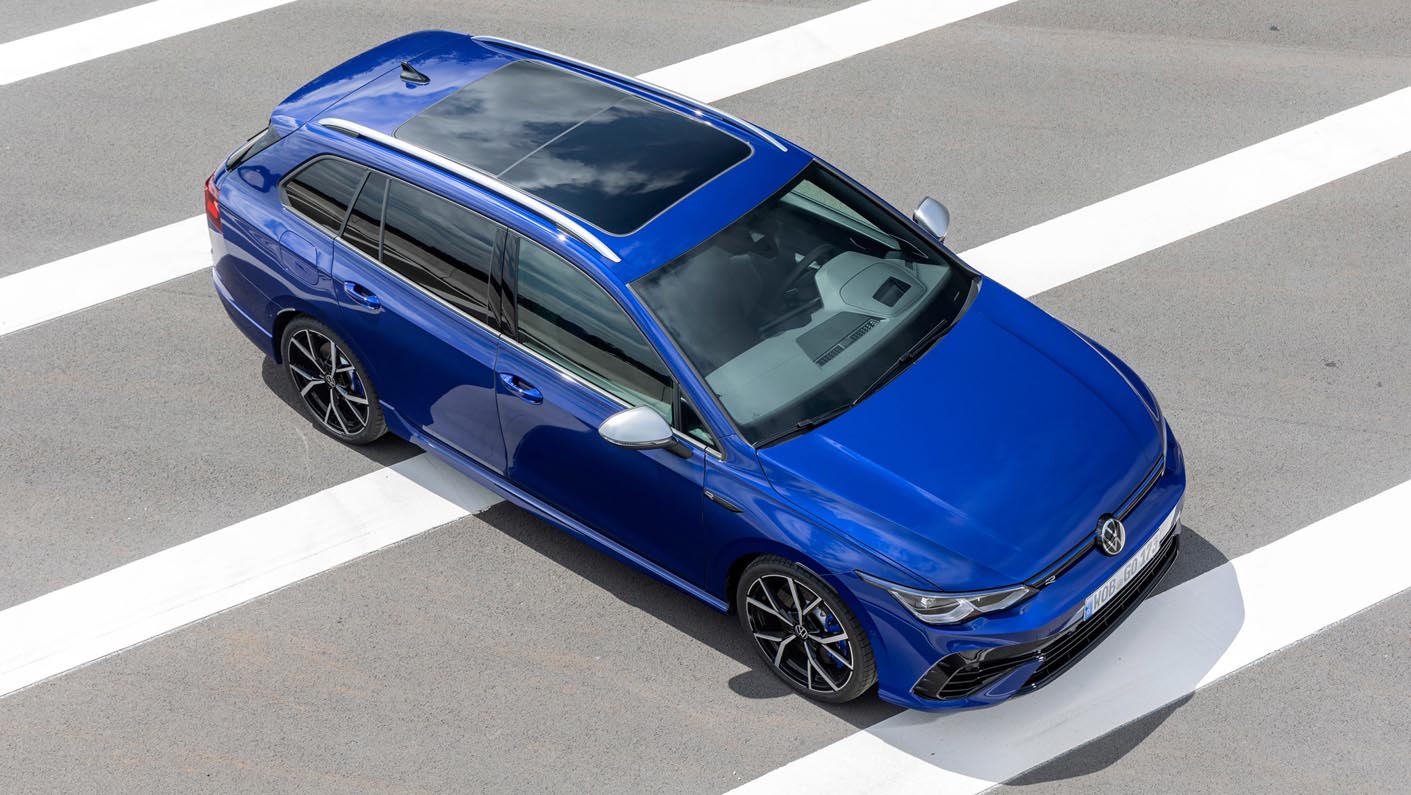
Ambience and seats
The up to five occupants can also enjoy the sporty benefits of the Golf R Estate in the interior. Everyone can experience the R-specific door trims, put their feet on floor mats sporting the R logo and in the R-specific colour scheme and enjoy the journey under a black headliner. The background lighting synchronised with the display ensures a very special mood. Thirty colours are available – they unobtrusively light up the dash panel and doors. Carbon Grey decorative trim can be found on the dash panel. Both the driver and the front passenger can operate the 10-inch touch screen in the centre of the dash panel. The Infotainment system and the navigation can, for instance, be controlled via the high-resolution, touch-sensitive display.
R Performance steering wheel and pedals
In addition to breathtaking performance, the driver can also enjoy the very special pleasures of the R model – with impressive pedal caps and a driver foot rest made of brushed stainless steel. The driver holds the most important instrument in their hands: the R-specific multifunction leather sports steering wheel, which is flattened at the bottom. It stands out thanks to a blue steering wheel clip with R logo on the bottom two spokes and high-quality blue decorative seams. The R button is particularly handy. The driver uses it to select one of four – or in the case of the R Performance package six – driving profiles directly. A more forceful press of the R button also activates the Race profile directly. The back of the steering wheel has ergonomically designed DSG shift paddles that are larger than in the other Golf models as they, for instance, must be easy to access when driving through bends on the race track.
Individualised welcome
The display and operating elements of the current Golf models are largely digital. The new Golf R Estate also benefits from this. Passengers are always welcomed with an R welcome screen on the touch screen of the Infotainment system as soon as the vehicle is opened with the vehicle key that also sports a special R finish. The welcome naturally also works when accessing the vehicle with optional Keyless Access.
Touch features instead of buttons
Compared to the predecessor model, the operation for the driver has been almost completely redesigned – except for the superior ergonomics. The VW Golf R Estate has state-of-the-art equipment with its new digital interfaces:touch panels, touch sliders and touchscreens perform the functions of conventional buttons and analogue displays.
The Digital Cockpit Pro
The graphic of the R logo welcomes R drivers as soon as Digital Cockpit Pro is activated. The View button in the new multifunction leather steering wheel enables a variety of layouts that are already known from other models of the product line to be displayed. Like the Golf R, the Golf R Estate also has the so-called sport skin. This includes the central round rev counter in R-specific design including the R logo. The Golf R Estate also offers a 3D-look layout with numerical fields, known as the R View. As an exclusive feature, there is a new, horizontal rev counter at the top edge of the display. The scale for this flat, horizontal display ranges from 0 to 8 (equivalent to 0 to 8,000 revs per minute). In the Special and Drift driving profiles – with manual DSG mode simultaneously activated – the display provides the easy-to-see “shift light”, i.e. a gear recommendation for switching up a gear to the rpm limit via the shift paddle or via a shift-by-wire button in the centre console. The shift light relieves the driver, for example, from watching the rev counter on the race track – a very important aspect as the automatic upshift is deliberately de-activated in the Special and Drift driving profiles. As additional information, the Digital Cockpit Pro in the Golf R Estate can also display current data such as the charge pressure, gearbox temperature, torque, power, G forces and the torque distribution of the all-wheel drive. The Digital Cockpit Pro in the VW Golf R Estate is also equipped with a lap timer for measuring time on the race track.
Connected at the highest level
Like all current Volkswagen models, the new Golf R Estate is optimally connected with its owner or user. The basis for this includes standard digital instruments (Digital Cockpit Pro) with a ten-inch display, the Ready 2 Discover Infotainment system (10.0-inch touchscreen) and the multifunction sports steering wheel. It’s important to note that all infotainment systems form part of the new, third generation of the modular infotainment matrix (MIB3). They are all linked to an online connectivity unit (OCU) featuring an eSIM. OCU and eSIM provide access to a permanently growing range of online-based functions and services that are made available using the brand’s own Volkswagen We ecosystem. Of course, the new Golf R Estate is prepared for the range of We Connect and We Connect Plus.
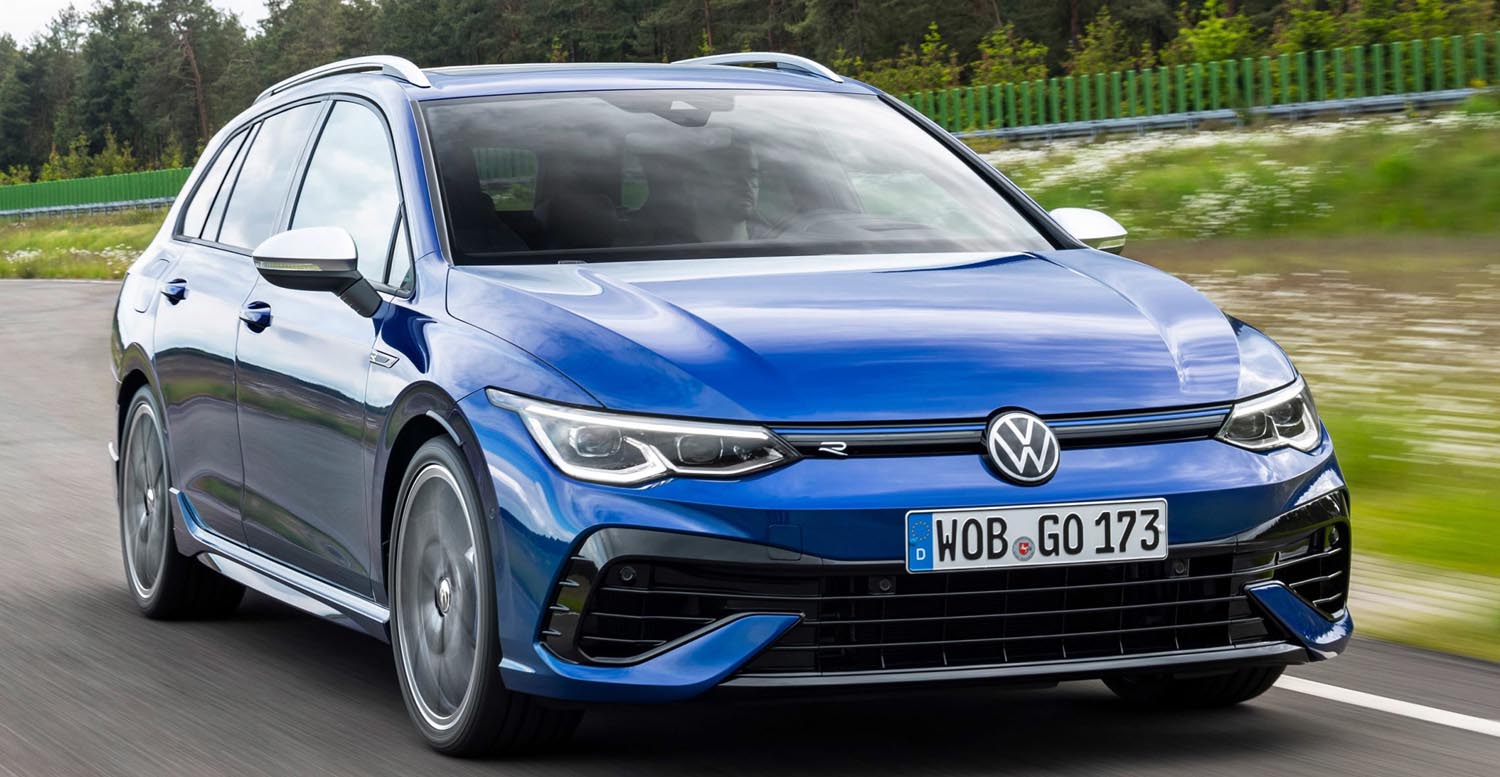
Digital operation of light, vision, temperature and sound
The light and vision functions of all Golf models have been re-designed, re-bundled and are now more intuitively operable: the lights as well as the windscreen and rear window heating are operated using a digital panel to the left of the instruments. The centre console is also characterised by perfect ergonomics: this area is now clearer than ever – particularly with the inclusion of the shift-by-wire gear knob for the dual clutch gearboxes (DSG), which is significantly smaller than previously. The theme continues to flow across the new roof console, where Volkswagen has also digitalised the operation. The touch sliders are also used to adjust the temperature of the air conditioning system and to control the volume.
Networked infotainment and entertainment
As an option, the driver’s digital workplace can be equipped with the Discover Media or Discover Pro navigation system. Among other things, Discover Pro features high-end map navigation and natural voice control. In addition, a windscreen head up display is available, which projects all the important information on the windscreen and thus virtually in front of the driver so that it is directly in the driver’s field of vision and they do not have to take their eyes off the road.
Harman Kardon sound system
There are moments in life when one wants to hear more than just the throaty sound of the engine, for example, concert music. The optional 480-watt Harman Kardon sound system has been completely redeveloped for this purpose. It includes a 12-channel Ethernet amplifier and ten loudspeakers. There is one treble speaker with a 60-millimetres diameter in the A-pillars and rear door trim, and a bass speaker (168 millimetres) in the front and rear door trim panels on each side of the vehicle. In addition, there is a centre speaker (116 millimetres) in the dash panel at the front, and a subwoofer (18 inches in diameter) fitted into the spare wheel well at the back.
Intuitive voice control
Operation in the Golf R Estate can also be supported by new, natural, learning voice control on request. The system is activated by saying “Hello Volkswagen” or pressing the voice button on the steering wheel. For instance, the Volkswagen Golf R Estate now responds with “Yes, please?” and “What would you like to do?” and reacts to intuitive voice commands, such as “I’m cold” with the right automatic air conditioner setting. The navigation system, air conditioning system, phone and Infotainment system can be controlled with voice commands. New, digital microphones not only ensure perfect voice recognition and voice quality such as for phone calls, but also locate the person who is speaking, be it the driver or front passenger.
Alexa comes with
For paired smartphones with an Android operating system, the Alexa voice assistant is on board and can implement commands in English (US/UK), German, French, Italian and Spanish. Alexa helps with point-of-interest (POI) searches nearby, POI input for navigation and volume control. Functions normally used at home can also be called up, such as information requests, weather information, news, opening times, and smart home controls. All it takes is a command spoken in the car, such as “Alexa, switch the light on in the lounge,” is all it takes to activate the relevant function in the connected home.
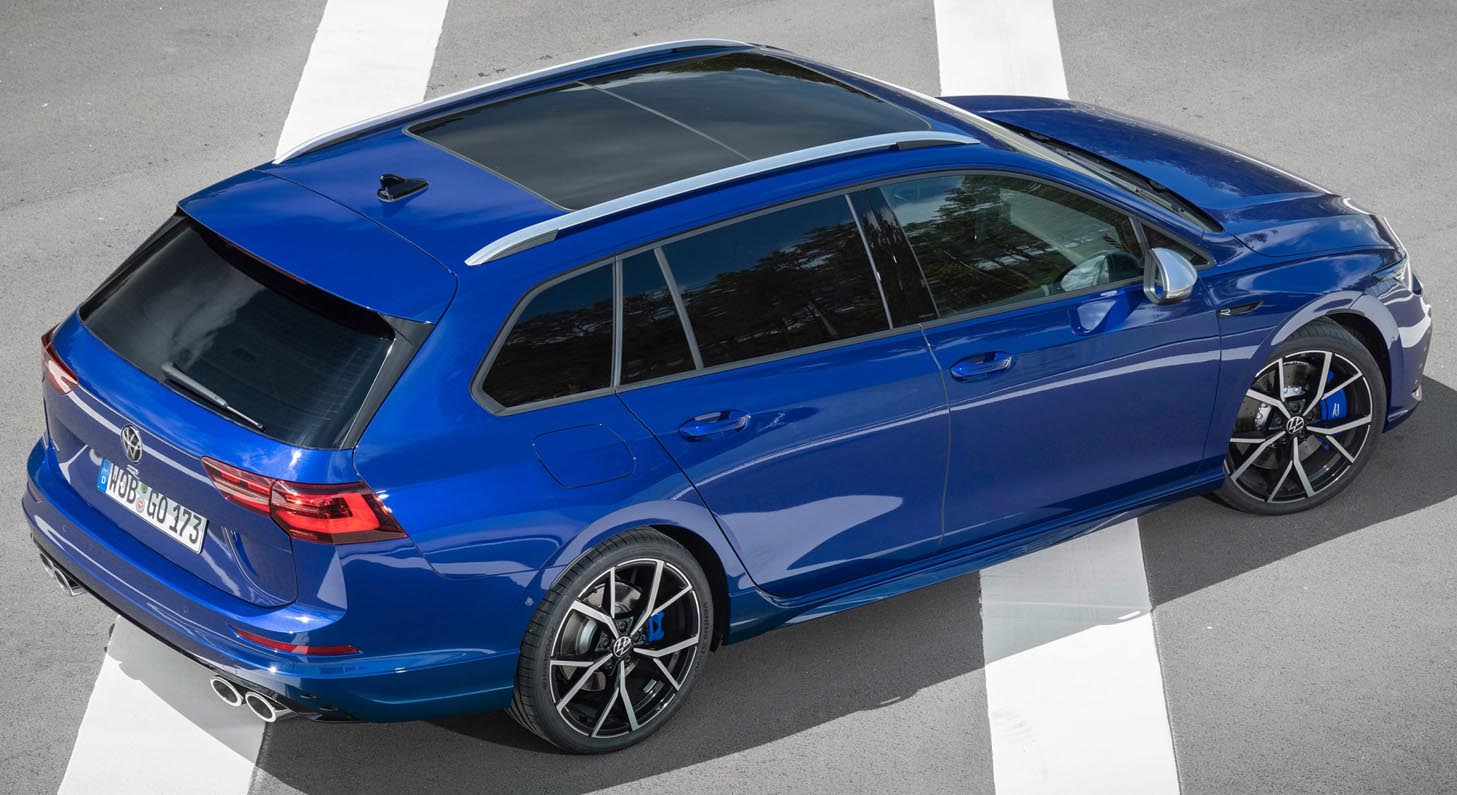 Wireless App Connect
Wireless App Connect
The Golf R Estate offers additional comfort with the standard Wireless App Connect. Drivers and front passengers can use App Connect to directly access selected smartphone apps using the Infotainment system. With newer iPhones and Apple CarPlayTM, this also works wirelessly via Bluetooth. The Golf R Estate is also prepared for We Connect and We Connect Plus. In addition, extensive personalisation (storage of personal settings) and the eCall emergency call system (automatic or manual assistance in emergency situations via a multilingual call centre) are on-board as basic functions.
Mobile key
The compatible smartphone optionally becomes the vehicle key thanks to the We Connect interface; a mobile phone connection is superfluous. It is sufficient to hold the smartphone near the door handle in the same way as the keyless locking and starting system Keyless Access opens the Golf R Estate. Place the smartphone in the storage compartment with interface for mobile telephone of the centre console to start the engine. Furthermore, it is possible to send the mobile key to trusted people so that they can also use their smartphone as a key.
One for all
As much as the new Volkswagen Golf R Estate fascinates with its power and technology – it can do even more. Because despite all its sporty attributes, it is still a fully everyday estate. Like the less sporty versions, the new generation Golf R Estate is 4,633 millimetres long, an increase of 349 millimetres compared to the predecessor model. The wheelbase has also increased, from 2,620 to 2,678 millimetres. The increased exterior length and wheelbase benefit the vehicle interior of the Golf R Estate. The rear passengers in particular benefit from the larger dimensions: the maximum legroom increases from 903 to 941 millimetres. Even when fully loaded with five people, the luggage compartment offers 611 litres of luggage volume when loaded up to the top of the rear seat backrest, which represents an increase of six litres compared to the predecessor. If only two people are sitting in the front of the Golf R Estate, the full load volume up to the roof lining can be utilised. To do this, fold down the rear seats and backrests and make use of a luggage net. In this way, the maximum storage space of 1,642 litres can be used safely. This provides an additional 22 litres. Convenient bag hooks, lashing eyes and luggage compartment lighting help to stow the load safely. In the right side trim, there is a standard 12 V connection and a 230-volt socket as well as the control for the electrically extending and retracting towing bracket. If both hands are busy holding shopping or luggage, the electrically operated boot lid (optional) can alternatively be opened by making a kicking movement below the rear of the vehicle. For the first time, the Volkswagen Golf R Estate is available with an optional ball coupling with a permitted maximum trailer weight (braked) of up to 1.9 tonnes and a drawbar load of 80 kilograms.
The target group
Breathtaking agility, powerful design, above-average transport options with full everyday usability – that’s what customers expect from the new Golf R Estate. Performance and top speed of the Golf R Estate play a major role in the purchase decision, directly followed by the convincing 4MOTION all-wheel drive with R Performance Torque Vectoring and the enormous torque. Of course, the sporty exterior design and the advantages of an estate car are also relevant.
The markets
The new Golf R Estate will be available from approximately mid-August 2021 in the most important markets of Germany, the United Kingdom and Switzerland.
Top performance in six generations
The first Golf Estate was launched as early as 1993 – as an estate version of the Golf III. As with all five subsequent generations, the first Estate was based on the platform of the Golf saloon and quickly became the top car in the compact class. The basic version started with 55 PS, provided by a 1.4-litre four-cylinder petrol engine. Right from the start, various engine versions could be ordered with an all-wheel drive. From the end of 1994, the first very sporty Golf Estate came onto the market with a VR6 engine, 190 PS, a maximum of 245 Newton metres of torque and all-wheel drive as standard. While the second generation of the Estate had a peak output of only 115 PS, the third generation came with a lot of power: The Golf Estate, which was then known as the Volkswagen Bora Estate, had a peak engine output of 204 PS thanks to the VR6 engine. With an all-wheel drive, it accelerated up to 235 km/h and sprinted from 0 to 100 km/h in 7.6 seconds. From the beginning of 2007, the Estate of the fifth Golf generation offered a 2.0 TSI delivering 147 kW (200 PS) and 280 Nm acting on the front wheels. In its last version, the vehicle reached a top speed of 235 km/h with a manual gearbox. In 2009, the next generation followed with the 1.4 TSI as the top model, which meant 118 kW (160 PS). The Estate came with a six-speed manual gearbox as standard, with a dual clutch gearbox available as an option. In 2015, a VW Golf R Estate based on the Golf VII came onto the stage for the first time. The 2.0 TSI R with two-litre turbocharged four-cylinder had a surprising 221 kW (300 PS) and 380 Nm at the beginning of 2015. 4MOTION all-wheel drive and a six-speed DSG were on-board as standard. The sprint was achieved in 5.1 seconds with the top speed being electronically limited to 250 km/h. A facelift at the beginning of 2017 gave the top Estate another ten PS more, which reduced the sprint to 100 km/h to 4.9 seconds, the top speed remained at 250 km/h as standard with 270 km/h as an option in the Performance package. At the end of 2018, the engine output was limited to 300 PS with only minimal losses in sprinting performance and 250 km/h still as standard (270 km/h optional). With the new R Performance Torque Vectoring, 20 PS and 20 Nm more engine output as well as standard and optional R Performance items, the new Golf R Estate is now entering unprecedented spheres as a powerful sports Estate car from Volkswagen.
https://youtu.be/zqwWCS0Gwm4
